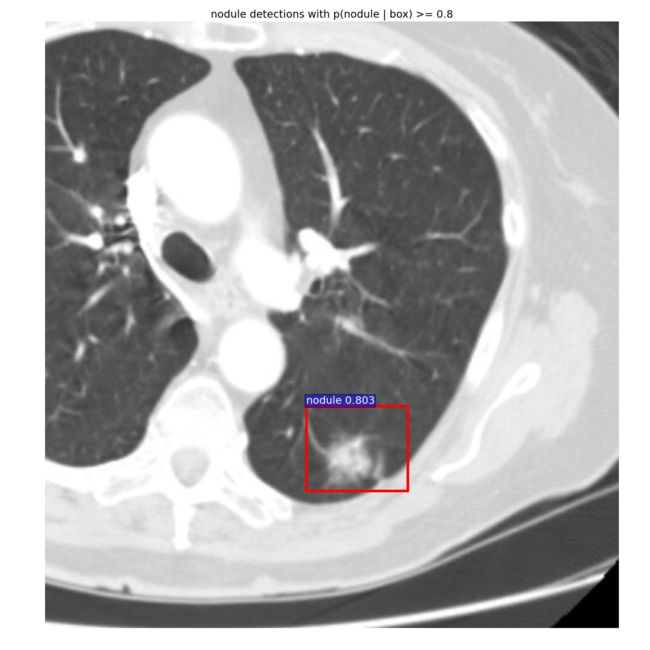基于Faster RCNN的医学图像检测(肺结节检测)
Faster-R-CNN算法由两大模块组成:1.PRN候选框提取模块 2.Fast R-CNN检测模块。其中,RPN是全卷积神经网络,用于提取候选框;Fast R-CNN基于RPN提取的proposal检测并识别proposal中的目标。
在 学习Faster-RCNN (py-faster-rcnn demo)的基础上 用自己的数据训练 这里选择的是CT肺数据,关于数据处理方面的问题参照我博客 : caffe finetune predict and detect the lung nodule
以及做成Faster RCNN格式的数据 参照我的博客:将自己的数据做成Faster RCNN的格式(VOC2007格式)
修改参数
这里主要介绍一下怎么修改Faster RCNN中的一些参数。
1.py-faster-rcnn/models/pascal_voc/ZF/faster_rcnn_alt_opt/stage1_fast_rcnn_train.pt修改
layer {
name: 'data'
type: 'Python'
top: 'data'
top: 'rois'
top: 'labels'
top: 'bbox_targets'
top: 'bbox_inside_weights'
top: 'bbox_outside_weights'
python_param {
module: 'roi_data_layer.layer'
layer: 'RoIDataLayer'
param_str: "'num_classes': 2" #按训练集类别改,该值为类别数+1
}
}layer {
name: "cls_score"
type: "InnerProduct"
bottom: "fc7"
top: "cls_score"
param { lr_mult: 1.0 }
param { lr_mult: 2.0 }
inner_product_param {
num_output: 2 #按训练集类别改,该值为类别数+1
weight_filler {
type: "gaussian"
std: 0.01
}
bias_filler {
type: "constant"
value: 0
}
}
}layer {
name: "bbox_pred"
type: "InnerProduct"
bottom: "fc7"
top: "bbox_pred"
param { lr_mult: 1.0 }
param { lr_mult: 2.0 }
inner_product_param {
num_output: 8 #按训练集类别改,该值为(类别数+1)*4
weight_filler {
type: "gaussian"
std: 0.001
}
bias_filler {
type: "constant"
value: 0
}
}
}2.py-faster-rcnn/models/pascal_voc/ZF/faster_rcnn_alt_opt/stage1_rpn_train.pt修改
layer {
name: 'input-data'
type: 'Python'
top: 'data'
top: 'im_info'
top: 'gt_boxes'
python_param {
module: 'roi_data_layer.layer'
layer: 'RoIDataLayer'
param_str: "'num_classes': 2" #按训练集类别改,该值为类别数+1
}
}3.py-faster-rcnn/models/pascal_voc/ZF/faster_rcnn_alt_opt/stage2_fast_rcnn_train.pt修改
ayer {
name: 'data'
type: 'Python'
top: 'data'
top: 'rois'
top: 'labels'
top: 'bbox_targets'
top: 'bbox_inside_weights'
top: 'bbox_outside_weights'
python_param {
module: 'roi_data_layer.layer'
layer: 'RoIDataLayer'
param_str: "'num_classes': 2" #按训练集类别改,该值为类别数+1
}
} layer {
name: "cls_score"
type: "InnerProduct"
bottom: "fc7"
top: "cls_score"
param { lr_mult: 1.0 }
param { lr_mult: 2.0 }
inner_product_param {
num_output: 2 #按训练集类别改,该值为类别数+1
weight_filler {
type: "gaussian"
std: 0.01
}
bias_filler {
type: "constant"
value: 0
}
}
}layer {
name: "bbox_pred"
type: "InnerProduct"
bottom: "fc7"
top: "bbox_pred"
param { lr_mult: 1.0 }
param { lr_mult: 2.0 }
inner_product_param {
num_output: 8 #按训练集类别改,该值为(类别数+1)*4
weight_filler {
type: "gaussian"
std: 0.001
}
bias_filler {
type: "constant"
value: 0
}
}
} 4.py-faster-rcnn/models/pascal_voc/ZF/faster_rcnn_alt_opt/stage2_rpn_train.pt修改
layer {
name: 'input-data'
type: 'Python'
top: 'data'
top: 'im_info'
top: 'gt_boxes'
python_param {
module: 'roi_data_layer.layer'
layer: 'RoIDataLayer'
param_str: "'num_classes': 2" #按训练集类别改,该值为类别数+1
}
} 5.py-faster-rcnn/models/pascal_voc/ZF/faster_rcnn_alt_opt/faster_rcnn_test.pt修改
这个是在测试阶段需要
layer {
name: "cls_score"
type: "InnerProduct"
bottom: "fc7"
top: "cls_score"
inner_product_param {
num_output: 2#按训练集类别改,该值为类别数+1
}
} layer {
name: "bbox_pred"
type: "InnerProduct"
bottom: "fc7"
top: "bbox_pred"
inner_product_param {
num_output: 8 #按训练集类别改,该值为(类别数+1)*4
}
} 6.py-faster-rcnn/lib/datasets/pascal_voc.py修改
class pascal_voc(imdb):
def __init__(self, image_set, year, devkit_path=None):
imdb.__init__(self, 'voc_' + year + '_' + image_set)
self._year = year
self._image_set = image_set
self._devkit_path = self._get_default_path() if devkit_path is None \
else devkit_path
self._data_path = os.path.join(self._devkit_path, 'VOC' + self._year)
self._classes = ('__background__','nodule') # bg always index 0
用你生成的数据集直接替换原来VOC2007内的Annotations,ImageSets和JPEGImages即可,以免出现各种错误。
!!!为防止与之前的模型搞混,训练前把output文件夹删除(或改个其他名),还要把py-faster-rcnn/data/cache中的文件和py-faster-rcnn/data/VOCdevkit2007/annotations_cache中的文件删除(如果有的话)。
至于学习率等之类的设置,可在py-faster-rcnn/models/pascal_voc/ZF/faster_rcnn_alt_opt中的solve文件设置,迭代次数可在py-faster-rcnn\tools的train_faster_rcnn_alt_opt.py中修改:
max_iters = [80000, 40000, 80000, 40000] 分别为4个阶段(rpn第1阶段,fast rcnn第1阶段,rpn第2阶段,fast rcnn第2阶段)的迭代次数。可改成你希望的迭代次数。
如果改了这些数值,最好把py-faster-rcnn/models/pascal_voc/ZF/faster_rcnn_alt_opt里对应的solver文件(有4个)也修改,stepsize小于上面修改的数值。
开始训练
进入py-faster-rcnn,执行:
./experiments/scripts/faster_rcnn_alt_opt.sh 0 ZF pascal_voc 这样,就开始训练了。
测试
将训练得到的py-faster-rcnn\output\faster_rcnn_alt_opt***_trainval中ZF的caffemodel(ZF_faster_rcnn_final.caffemodel)拷贝至py-faster-rcnn\data\faster_rcnn_models(如果没有这个文件夹,就新建一个),然后,修改:
py-faster-rcnn\tools\demo.py,主要修改:
CLASSES = ('__background__','nodule')
# 'aeroplane', 'bicycle', 'bird', 'boat',
# 'bottle', 'bus', 'car', 'cat', 'chair',
# 'cow', 'diningtable', 'dog', 'horse',
# 'motorbike', 'person', 'pottedplant',
# 'sheep', 'sofa', 'train', 'tvmonitor')
改成你的数据集标签;
NETS = {'vgg16': ('VGG16',
'VGG16_faster_rcnn_final.caffemodel'),
'zf': ('ZF',
'ZF_faster_rcnn_final.caffemodel')} 上面ZF的caffemodel改成你的caffemodel,如果名字一致则无需更改~
im_names = ['1559.jpg','1564.jpg'] 改成你的测试图片。(测试图片放在py-faster-rcnn\data\demo中)
结果
在py-faster-rcnn下,
执行:
./tools/demo.py --net zf 总结
这只是跑通了,还没有达到要求 因此还需要进一步学习其中的机制~

